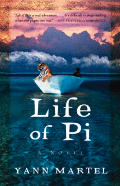
| Publisher: | Harcourt |
| Copyright: | 2001 |
| Printing: | May 2004 |
| ISBN: | 0-15-603020-9 |
| Format: | Trade paperback |
| Pages: | 401 |
I'd seen this book several times, in best-seller lists and displays in bookstores, and had even picked it up a few times and put it back down again. Somehow, I got a rather erroneous impression of it, thinking it would be some sort of talking animal story, a cute tale with moral lessons for life. I'm not sure where I got that impression, and fortunately it couldn't have been more wrong.
The first hundred pages introduce Piscine Molitor Patel, an Indian boy named after a French swimming pool, the son of a zookeeper who grew up around zoo animals and the people who took care of them. This was my favorite portion of the book, full of fascinating anecdotes about zoos and animal behavior, the story of Pi's name, and his desire to be Hindu, Christian, and Moslem at the same time because he loved all three religions. I could have happily read a whole book with no more plot than this. Martel's characterization and use of language are top-notch, and Life of Pi is wonderfully readable, the words flowing comfortably and keeping the reader turning pages.
The main story of the book, the part mentioned in summaries and on the back of the book, begins a quarter of the way through, when the ship bearing Pi's family and much of the zoo collection sinks in the Pacific. From that point, the story becomes a more linear adventure as Pi tries to survive in a lifeboat on the open sea and reach an accommodation with the few animals that had escaped before the boat sunk and had also ended up on the boat.
There are no talking animals here, or cute personification, or easy moral lessons. Martel portrays nature as it truly is, realistically brutal and unpretentious, and is blunt and forthright in his descriptions of what Pi tries and is driven to. I often find survival stories of this type boring after a while, but Martel's deft and succinct descriptions and excellent portrayal of the thought processes of a smart and scared sixteen-year-old boy kept my interest all the way through. I wouldn't say that the entire story is realistic, as it features some huge coincidences and is not trying to be true-to-life, but it has a feeling of realism in detail, of being based on true animal behavior, human capability, and the threats of the open ocean that I find missing from so many adventure stories.
There is a spiritual subtext to the story, including a wonderfully subtle comment at the end about the nature of story, religion, and belief, but there is no obvious moral and the story is not preachy (apart from one in-character diatribe against agnosticism). Rather, Martel gives the reader a story and a character, puts the reader inside the character's mind to see what motivates them, and then lets the reader draw their own conclusions.
I've seen this book classified with children's literature. Don't let that put you off, or be discouraged by the literary awards that it's won. There are both layers of symbolism to explore if you wish and an excellent, clear, readable story that kept me engrossed right up to the last sentence of the last page. Highly recommended.
Reviewed: 2004-12-30